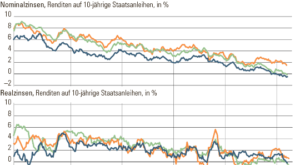On Marginal Revolution, Alex Tabarrok reports based on a NY Times feature that genetically modified crops do not deliver what they were expected to.
Read More »Conference in Honor of Bob King at the Study Center Gerzensee
Jointly with the Journal of Monetary Economics and the Swiss National Bank, the Study Center Gerzensee organized a conference in honor of Bob King, long-term supporter of the Study Center. Program: PDF. Jaume Ventura’s discussion of a paper on trade and growth by Alvarez and Lucas: PDF. My discussion of a paper on debt and debt constraints by Bhandari, Evans, Golosov, and Sargent: PDF.
Read More »Nominal and Real Interest Rates over the Medium Term
From the NZZ:
Read More »Good and Bad International Commitments
On his blog, Dani Rodrik argues that the fact that an international rule is negotiated and accepted by a democratically elected government does not inherently make that rule democratically legitimate. Rodrik distinguishes two types of international commitments. On the one hand, there are commitments that help to overcome time-inconsistency problems. [For example, the government] would like to commit to free trade or to fiscal balance, but realizes that over time it will give in to...
Read More »Owner-Occupied Housing and Wealth Inequality
On VoxEU, Gianni La Cava summarizes his research on the secular rise in the housing share of US income. In the US national accounts, income accruing to the housing sector is measured as ‘net housing capital income’, or simply, net rental income (i.e. gross rents less housing costs, such as depreciation and property taxes). This measure includes rental income going to both owner-occupiers (imputed rent) and landlords (market rent). The very detailed nature of the Bureau of Economic...
Read More »Pawn Shops, Information Insensitivity, and Debt-on-Debt
In a BIS working paper (January 2015), Bengt Holmstrom summarizes some of the implications of the research on information insensitive debt. He cautions against moves to increase transparency in debt markets and defends the shadow banking system. He explains why opacity and information insensitivity are valuable and argues that debt-on-debt arrangements are (privately) optimal. It all started with pawn shops: The beauty lies in the fact that collateralised lending obviates the need to...
Read More »“Central Banking and Bitcoin: Not yet a Threat,” VoxEU, 2016
VoxEU, October 19, 2016. HTML. Central banks are increasingly interested in employing blockchain technologies. The blockchain threatens the intermediation business. Central banks encounter the blockchain in the form of new krypto currencies, and as the technology underlying new clearing and settlement systems. Krypto currencies bear the risk of “dollarization,” but in the major currency areas this risk is still small. New clearing and settlement systems benefit from central bank...
Read More »“Causes of the Transformation of the US Fiscal System in the 1930s,” VoxEU, 2016
VoxEU, October 11, 2016, with Martin Gonzalez-Eiras. HTML. The US fiscal system underwent a radical transformation around the time of the Great Depression. Perceived cost differences of revenue collection across levels of government, due to general equilibrium effects, can partly explain the rise of tax centralization and intergovernmental grants. We develop a micro-founded general equilibrium model that blends politics and macroeconomics. (See the working paper.)
Read More »Nobel Laureates? École Normale Supérieure
In Nature, Tom Clynes reports about research indicating that École Normale Supérieure has the highest proportion of undergraduates that eventually win a Nobel prize. The California Institute of Technology comes second ahead of Harvard, Swarthmore, Cambridge, École Polytechnique, MIT, Columbia, Amherst, and Chicago.
Read More »Are We Real?
In the Guardian, Olivia Solon reports about the discussion on whether life as we experience it likely is a simulation. Pro: … videogames are becoming more and more sophisticated and in the future we’ll be able to have simulations of conscious entities inside them. … If there are many more simulated minds than organic ones, then the chances of us being among the real minds starts to look more and more unlikely. … That we might be in a simulation is … a simpler explanation for our existence...
Read More » Dirk Niepelt
Dirk Niepelt

